|
A Genre Mourns
The crime writing world is still in shock following news of the death at the age of only 25, of Scandinavian superstar Nisse Ektorp in a tragic accident in a Stockholm underpass.

A household name in Scandinavia even before she turned to crime writing, Nisse Ektorp had enjoyed success as a super-model, a Michelin-starred chef and an investigative journalist. By the age of 22 she had traversed the frozen Gulf of Bothnia by dog-sled, played bass in the Finnish death-metal band Astral Reich, launched her own brand range of thermal lingerie and for two seasons had been ‘The Stig’ in the Swedish version of Top Gear.
But it was crime writing which brought her to the attention of warmer parts of the world when her first novel, The Blood Apple, became an international bestseller on its translation into English. The book introduced her distinctive detective duo of Inspector Orm Tostesson and Sergeant Toke Grey-Gullson, who both have ‘issues’ with drugs, alcohol, trans-sexuality and cross-dressing whilst being Born Again Christians.
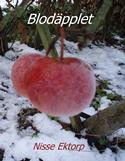 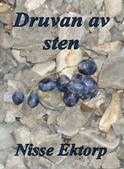 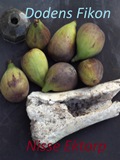
Blodäpplet’s 750-pages was quickly followed the 900-page Druven av Sten, or The Stone Grapes as it became in English, and Nisse announced that these were in fact the two parts of the trilogy which would become known as The Fruits of the Doom. The 1,000-page third volume, Dodens Fikon will now be published posthumously in English as The Figs of Death and is expected to be another best-seller. Already seven different film versions of the Doom trilogy are in pre-production and the 49-part Danish television series (based on the first two chapters of Book 1), Havat is already being remade for BBC4 starring Kenneth Branagh and Eddie Redmayne and for the Fox Network in America, starring Bruce Willis and Jack Black.

It has also been announced that Professor Barry Forshaw, author of the seminal guide to Scandinavian crime fiction, Death in A Cold Climate (published by Palgrave Macmillan and a snip at £16.99), has already written the definitive biography of Nisse Ektorp, to be published by Renat & Spendrups under the title The Girl Who Came Too Soon.
Out to Lunch
In March I eschewed the endless round of publishers’ parties and book launches, preferring instead to spend quality time with some of my favourite authors over a series of extremely civilised lunches.
It was a delight to meet up with Len Deighton, his charming wife Ysabele and Rob Mallows (of the website The Deighton Dossier) on the Deightons’ recent flying visit to London.

In one of those bizarre coincidences which would have been edited out of any sensible novel, Len mentioned that he and his wife were en route to Holland where they hoped to see a stage play based on the life of an uncle of Ysabele’s, entitled Soldier of Orange. Incredibly, I had acquired the book on which the play is based – the wartime memoirs of the outrageously heroic Erik Hazelhof Roelfzema (1917-2007) – only days before lunching with the Deightons, totally unaware of any connection.

To maintain the theme of weird coincidences, I told the story of Emma Hayter, the BBC producer who recruited me on to the Lovejoy scriptwriting team twenty years ago, who had always maintained that she got her first taste of show business by bunking off school in Brighton to work as a ‘runner’ on the location filming of the 1969 movie Oh What A Lovely War, which was, of course, produced by Len Deighton….
*
It is always a treat to catch up with my old chum and fellow boulevardier Justin Scott and his vivacious wife Amber whenever they cross the Atlantic and an invitation to join them at their London club was so tempting it even persuaded the Dowager Lady Ripster to make the long and arduous trek up from the country.
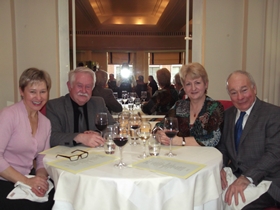
I wish I could claim credit (I would have done if I’d thought of it first) for the pleasant surprise which greeted Justin on his arrival in London, for in the first bookshop he entered, there, on prominent display, were his two new books bothheading for bestsellerdom.
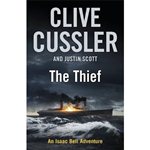 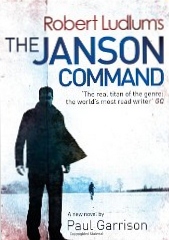
It was probably serendipity that the two thrillers were published more or less simultaneously, though I have a sentimental fondness for the theory that some astute bookseller or publisher realised the connection. Justin’s collaboration with Clive Cussler on the Isaac Bell historical thrillers is well known, and The Thief is the latest instalment, but The Janson Command is a new venture for Justin, continuing the scenario left by the late Robert Ludlum, under his pen-name of Paul Garrison. Astute readers of this column (some of them, perhaps, booksellers) will remember that it was in these very columns some years ago that ‘Paul Garrison’ was ‘outed’ and publicly revealed to be Justin Scott.
*
In my role as series editor for Top Notch Thrillers, it was a particular pleasure to meet noted spy-fiction author David Brierley, who lives in France, on a visit to his Savile Row tailors.
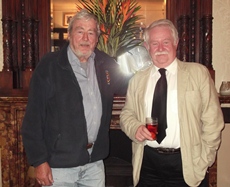
David’s wonderful 1979 thriller Cold War, which introduced the super-tough female agent Cody, was recently reissued as a Top Notch Thriller, winning a new generation of fans. I am sure more new fans will be created this summer when Top Notch republishes his fantastic 1982 historical spy story Big Bear, Little Bear, which is set in 1948 on the eve of the Berlin Air Lift.
On first publication, The Observer called it “espionage in the Le Carré class” and should the title confound my younger readers, the ‘Big Bear’ refers to Soviet Russia, then expanding its influence into eastern Europe, whereas ‘Little Bear’ is war-torn Berlin (the symbol of the city is a bear), which Stalin is determined to bring into the Soviet empire.
The Tempting Serpent
I am very cross with publisher Serpent’s Tail for sending me their latest catalogue of forthcoming titles in the second half of 2012. Well, not actually for sending me their catalogue (I am grateful for any communication from publishers these days), but for the dangled promises within it.
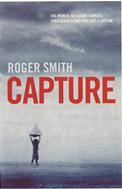
Firstly they tempt me with the news that there is a new Roger Smith novel, Capture, coming out, then they dash my hopes by saying (in the small print) that this will only be an “Export Edition” and that UK publication is scheduled for 2013.
Anyone still stuck in a Scandinavian time warp should take heed that the really exciting crime fiction is now coming from the South Africa, spearheaded by the triumvirate of ‘big beasts’ that are Deon Meyer, Mike Nicol and Roger Smith. You heard that here first – and I didn’t make you wait until 2013.
Gallic Charmers
I don’t have to wait at all for thelatest tempting offers from those charming people at Gallic Books, for their latest crime offerings (or ‘noir’ as I should say) are now out.
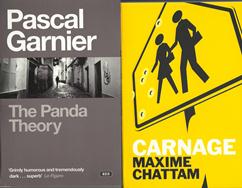
The panda in The Panda Theory is not a bamboo-munching exhibit in a Scottish zoo, but a cuddly toy won at a funfair in a small town in Brittany, in a story described as “a little jewel of black humour” from the late Pascal Garnier whose fiction has been compared to that of Simenon.
Gallic’s companion publication, Carnage by Maxime Chattam, may have been written by a Frenchman but is firmly set in Harlem in New York. The subject matter – a spate of Columbine-style school massacres – being a sadly believable reflection of our times.
The Distant Thunder (of a ripping yarn)
Although not strictly a crime novel, Distant Thunder by T. D. Griggs starts with a violent death – in Bangalore in India in 1893 – and swashbuckles its way across the British Empire in the last years of the 19th century.
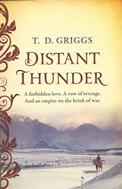
Now I have no particular interest in this period of Imperial history, but I know ‘sight unseen’ that this will be a good read as I thoroughly enjoyed Tim Griggs’ last book, The Warning Bell, a finely-written, atmospheric thriller set in Brittany with a WWII back story, published three years ago under the pen-name of Tom Macaulay.
No Pockets in a Shroud
You have to hand it to those perky publishers at Penguin for their inventive packaging of review titles. When their latest offering arrived here at Ripster Hall, a junior footman squealed like a girl and two of the under-stairs maids fainted on the spot. Even I had to slow the palpitations of my drumming heart with a snoot-full of gin, as my mother would have said.
What occasioned all the kerfuffle was an advance copy of a debut novel, The Yard, by American Alex Grecian, set in London in 1889 in the aftermath of the Ripper killings, which is to be published in June.
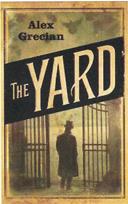
To add to the atmosphere, Penguin have cleverly added into their ‘press kit’ a reproduction Victorian poster detailing a ‘Ghastly Murder’ at Euston Square Station (‘there goes the neighbourhood’ I hear you cry) involving the discovery of a dead and mutilated police detective in a luggage trunk.
If this were not scary enough, my review copy of The Yard came sewn into its own blood-stained shroud! Or at least that’s what it looked like at first glance. On reflection it appears to be a piece of fine muslin and, oddly enough, brought back memories of my childhood attending a particularly vicious prep school in the wilds of Yorkshire.
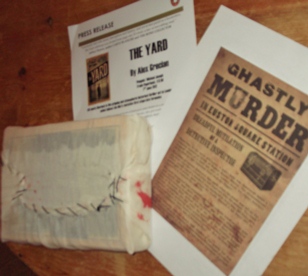
On the occasions, once a week, when we boys were allowed out of school grounds to forage for food, we would venture into nearby Wensleydale and attempt to beg some of the local cheese from a kindly farmer. The production of that famous cheese require straining through muslin and one always knew when manufacturing was taking place as the farmers’ wives and daughters would be wearing only one stocking, usually the left one for reasons I never did fathom….
|
|
In honour of Dorothy
It was heart-warming and reassuring to see a sell-out audience pack the Witham public library for the 20th annual Dorothy L. Sayers Lecture given by Martin Edwards. His theme was an evaluation of Dorothy Sayers (who lived next door to what is now the public library) as a student and writer of ‘true crime’.

It is actually 19 years since I was persuaded to give the second DLS Lecture following the inaugural one by P.D. James and I had been hoping to see the man who persuaded me at Witham last month. Sadly, Christopher Dean, the long-serving Chairman of the Dorothy L. Sayers Society was too ill to attend and died some ten days or so afterwards.
Over the course of the twenty or so years I knew him, his charm and enthusiasm were more than enough to persuade me to lecture at Society events at Newnham and Girton Colleges in Cambridge and at the University of Surrey, to contribute to the anthology Encounters with Lord Peter which he edited and, most bizarrely of all, help celebrate the 100th birthday of Lord Peter Wimsey at a ringing of Kent treble Bob Major (fans of The Nine Tailors will know what I mean) in the church at Terrington St Clement in Norfolk and as a consequence, make my first– and so far only – appearance on Radio 4’s Sunday Worship programme.
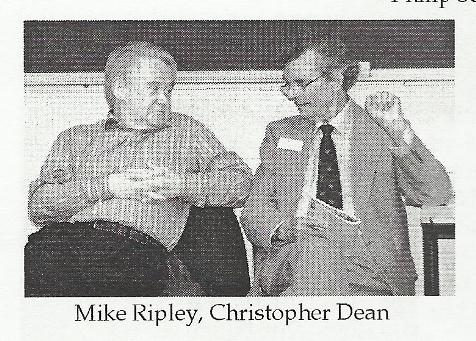
Anyone who had any dealings with Christopher cannot fail to have realised that they were dealing with a real English gentleman and his contribution to the work of the Dorothy L. Sayers Society both here and internationally – and the continued study and appreciation of all Sayers’ work (not just her crime writing) – was immense.
Revival Day
The latest revivals in Print-on-Demand and eBook from Top Notch Thrillers are two further adventures of Jonas Wilde – the British government’s unofficial official assassin code-named The Eliminator – the series hero created by Andrew York in the years 1966-75.
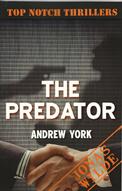 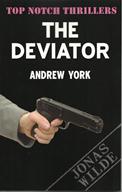
The Predator (from 1968) set in Italy and the USA pits Wilde against one of his most intriguing opponents: Glorious Torrio, a criminal female mastermind with Mafia connections and terrorist ambitions. For Wilde it is a very personal confrontation and one which can only end one way – fatally.
The Deviator (1969) sees Wilde back at the work he does best; assassinating enemies of the state with as little fuss as possible, preferably making the deaths appear accidental. In this case, Wilde’s target is a defecting scientist and as ‘the Eliminator’ pursues his target across Poland and into Russia, he finds he might just have totake on an additional job for the KGB in order to secure his escape –from the KGB.
The Jonas Wilde books, created by the prolific Christopher Nicole using one his many pen-names, enjoyed immense success when first published in the UK, the US, Italy and Germany and are acquiring something approaching cult status over 40 years later with a new generation of readers.
The Bloomsbury Set
Bloomsbury Publishing, in association with the Writers and Artists Yearbook, have just launched Short Sentence, a competition for crime stories of 1000 words or less, although perhaps‘challenge’ is a better word than competition as every other month, one of Bloomsbury’s crime authors will set a theme for the story. The first author involved is Parker Bilal and his challenge is to write a 1,000 crime story onthe theme of deception.
Every other month (up to November), a winner will be chosen and all winning short stories will be published as a Short Sentence eBook in 2013, which will be made available free from all online book retailers. One overall winner will be selected and receive a prize of a place at the Writers and Artists Yearbook conference and a week-end Rover Ticket for the Theakston’s Old Peculiar Crime Writing festival in 2013.
Full details can be found on www.shortsentence.co.uk.
Now I am sure that there are many young people of the Twitter generation who would baulk at the challenge of writing 1,000 characters let alone 1,000 words; and on the other hand, there are long-winded old fogeys like myself who would find it daunting to get a catchy title into 1,000 words. Either way, I do not think this is an easy challenge, and I will be interested to see the outcome.
In the meantime, if you are not of a competitive bent, why not just sit back and enjoy Bloomsbury’s latest crime offerings.
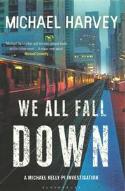 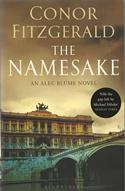
Already out is the new Chicago-based thriller from Michael Harvey, We All Fall Down, which I for one am looking forward to having thoroughly enjoyed his last novel to feature ex-cop-turned-private eye Michael Kelly, The Third Rail. I have a theory that there is a blossoming‘Chicago school’ of American crime writing, of which Marcus Sakey and Michael Harvey are the leading lights.
In April, the scene shifts from Chicago to Rome with a new Commissioner Alec Blume thriller, The Namesake, by Conor Fitzgerald. The Sunday Times has already claimed that Fizgerald’s Commissioner Blume series (this is the third) “fills the gap left by Michael Dibdin” which is a mighty big claim indeed.
Sort Of Interesting
A couple of years ago I reported on how impressed I had been with the thriller Bad Traffic, about a Chinese detective investigating very grim crimes in England, by an author I had not come across before, Simon Lewis, from a small publisher I had never heard of, Sort Of Books.
Some months later, I mentioned the book at a seminar on creative crime writing in that fine city of Norwich and was gratified to find that several of the students (though not the course tutor!) had not only heard of the book, but had read it, thanks in no small part to the favourable reviews it also received from my colleagues Peter Guttridge, Jane Jakeman, Marcel Berlins and the late Susanna Yager.

This month Simon Lewis launches a new novel, Border Run, which is set in the jungle border land between China and Burma and features two gap-year students caught in a scenario described as ‘Lord of the Flies meets The Beach’.
Burmese Tales
Now I am never one to ignore a link – however tenuous –and as one rarely comes across crime novels set in Burma (or Myanmar as we are now supposed to call it), I intend to capitalise on my mention of Border Run to recommend to anyone who will listen, three books which have long held pride of place in my library. None of them are crime novels and all are by writers more famous for other books, but all three authors had personal experience of Burma during World War II. Oh, and one other thing, they are all extremely well written.
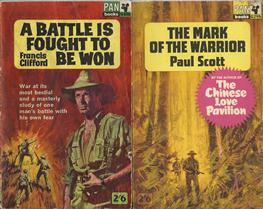
I read Francis Clifford’s A Battle Is Fought To Be Won long before I realised how much of an autobiographical novel it was and several years before I realised what a fine crime writer Francis Clifford was – he went on to write The Grosvenor Square Goodbye and many other disgracefully forgotten thrillers.
Similarly I read Paul Scott’s The Mark of the Warrior long before I became aware of The Jewel in the Crown and Scott’s masterful ‘Raj Quartet’.Interestingly, Clifford’s book came out within two years of Scott’s, but Scott generously ‘blurbed’ A Battle is Fought To Be Won as “the best novel about the Burma war.”
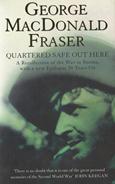
I knew and admired the Flashman novels of George MacDonald Fraser long before I read his brilliant memoir Quartered Safe Out Here. This is not a novel, but a painfully honest account of his experiences as a young soldier in Burma in 1945 and I have no hesitation in rating it as one of the best wartime memoirs ever written and, I think, MacDonald Fraser’s masterpiece.
Why mention these books at all? Well, for one thing this is the 70th anniversary of the defeat by the invading Japanese of the British forces in Burma (along with Chinese, American and Burmese allies) – a campaign in which Francis Clifford fought with distinction– and yet it remains one of the least-known and poorly-remembered bits of Second World War history. For another, as a boy I was aware of adults talking about “the Forgotten Army” and even, at school, being urged to read Field Marshal Slim’s military history Defeat Into Victory, though how much I understood of it at that age was moot.
It was only when I discovered the novels of Scott (an officer in the Indian army) and Clifford, that I really took an interest in the Burma campaign and began to understand my father’s outrage every time the Errol Flynn movie Objective Burma was shown on television.
These covers are made for walking…
If anyone is keeping count (for I am not) on how many covers feature a mysterious‘walking away man’(or woman) so far this year, here are four more.
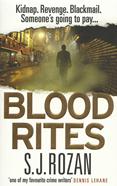 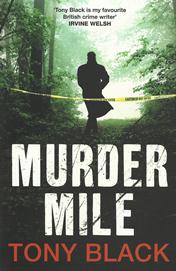
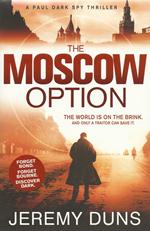 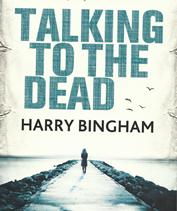
I fear they will not be the last….
No Socks Please, We’re British
It is well known that I always do as publishers tell me and so I will make sure that my sock suspenders are secure before I read Steven Dunne’s new thriller from Headline, Deity, be published in June.
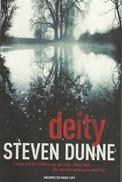
This Derbyshire-set serial killer thriller comes with advance praise from just about everyone at Headline from ‘Publisher At Large’ (which always wants to make me ask: Haven’t they caught him yet?) Martin Fletcher, the Head of Marketing, copy-editors and digital designers.

The one opinion I value above all others –and will take great heed of – is that of Publicity Supremo Sam Eades, who is not, I know, easily shocked. However, when she says of Deity that “It scared my socks off!” I take her warning seriously and will make sure that my sock suspenders are in tip-top working order.
I have always sworn by Threadgold’s Thorough-Grip Garterettes and though they are difficult to buy– and almost impossible to get serviced – these days, I will still recommend them to my chums at Headline.
Pip! Pip!
The Ripster

|